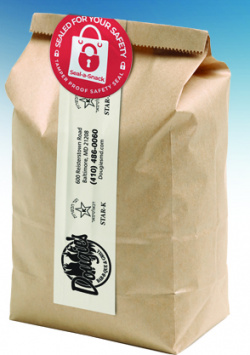Non-Jewish Food Vendors
From Halachipedia
Revision as of 00:24, 16 July 2019 by YitzchakSultan (talk | contribs) (→Kosher Food Left with a Non-Jew)
General
- From the Torah law, any time a piece of meat is found and one is unsure whether it is kosher or not, one may rely on majority. If majority of the butchers in town sell kosher meat, then one may presume that it is kosher. However, the Rabbis forbid any piece of meat that wasn't kept in sight of a Jew except in certain cases. [1]
- If a piece of kosher meat left one's eyesight it is presumed to be non-kosher unless it has a unique identifying mark, one recognizes its look and one is certain that it is the same piece of meat, or it was wrapped and sealed. [2]
Nowadays
- The Ashkenazic minhag is that anytime one leaves a piece of meat and finds it in the same place that one left it, it is presumed to be kosher. [3]
- For Sephardim, if one left meat in one's house and one's windows are closed so that birds can't come in, or if the meat was covered and remained covered, it is kosher. [4]
Packaging for Delivery
- Meat, fish, and uncooked wine need two seals if sent with a non-Jew. Cooked wine, milk, cheese, bread, or anything that is only of rabbinic concern only needs one seal if sent with a non-Jew.[5]
- Ashkenazim hold that after the fact anything sent by a non-Jew only needs one seal.[6]
- Putting two letters across the seal of a package is sufficient to classify as two seals.[7]
- A seal and a lock is like two seals, but one lock isn't even like one seal.[8]
Hired Delivery Man
- If a delivery man, non-Jewish or Jewish but not religious, is hired by a store he can be trusted to honestly delivery the food and not switch the food since he is afraid of loosing his job if he were found to be switching the food.[9]
Kosher Pots Left with a Non-Jew
- A person shouldn't leave kosher pots with a non-Jew otherwise there is a concern that they used the kosher pots for non-kosher food.[10] To avoid this issue one could either
- After the fact if one left one's kosher pots with a non-Jew such as with a maid for more than 18 minutes the kosher might have been made non-Kosher. As such one shouldn't use them for 24 hours but afterwards one can use them without kashering them.[13] Other poskim hold that after the fact the pots can be used immediately.[14]
Sources
- ↑ Shulchan Aruch YD 63:1
- ↑ Shulchan Aruch YD 63:1, Yalkut Yosef YD 63:2
- ↑ Rama YD 63:2 writes that the minhag is to assume that as long as the piece of meat is in the same place as it was earlier, it is the same piece of kosher meat. Be'er Heitiv YD 63:6 cites a dispute between the Shach who follows the Rama and the Taz who is even more lenient. Aruch HaShulchan YD 63:9 also rules like the Rama.
- ↑ Yalkut Yosef YD 63:1
- ↑ Gemara Avoda Zara 39a records the distinction of Rav between meat, fish, wine, and techelet which need two seals as opposed to milk, cheese, and bread which only need one. Rashi 39b s.v. asurin explains that the first category are expensive things and there's a higher concern that the non-Jew switched them. Rashba (Torat Habayit Haaruch 28a) explains that Rav's distinction depended on whether the food was of Biblical concern or rabbinic. Finally, the Ran Avoda Zara 16a s.v. chavit says that if there was a concern that the food itself would be non-kosher two seals are necessary but if the concern if only if non-kosher was mixed in or that it is only a rabbinic concern one seal is sufficient. Shulchan Aruch Y.D. 118:1 adopts the explanation of the Rashba. Shach 118:3 agrees.
- ↑ Tosfot Avoda Zara 31a s.v. damar quotes Rabbenu Tam as holding that for a non-Jew one seal is sufficient two seals are only necessary for a non-religious Jew. Ramban Avoda Zara 31a s.v. umafteach and Rashba 31a s.v. echad disagree with Rabbenu Tam. Ramban argues that the Rif and Bahag agree with him. Meiri 31a implies that the majority don't follow Rabbenu Tam. Nemukei Yosef Avoda Zara 31a cites Rabbenu Tam. Raah 31a distinguishes between food left in the property of a non-Jew that requires two seals but not if it is in the property of a Jew. Rama 118:1 follows the Rabbenu Tam after the fact based on the Iser Vheter 22:11. However, Shulchan Aruch Y.D. 118:1 rejects the opinion of Rabbenu Tam. Kaf Hachaim 118:21 writes that Rabbenu Tam isn't accepted even for a major loss but it could be used for a factor to be lenient together with other reasons.
- ↑ Ran Avoda Zara 11a, Shulchan Aruch Y.D. 118:3
- ↑ Ran Avoda Zara 11a, Shulchan Aruch Y.D. 118:4
- ↑ Shevet Hakehati 3:228 quoting Rav Shlomo Zalman Auerbach, Yalkut YosefIsur Vheter v. 1 p. 139
- ↑ Shulchan Aruch and Rama Y.D. 122:9
- ↑ Shach 122:9
- ↑ Tosfot Avoda Zara 12a s.v. vshadi writes that we're not concerned that the non-Jew will intentionally take something from a Jew unless he stands to benefit. Minchat Asher YD 2:51 s.v. vnireh writes if a non-Jew has pots designated for them we can assume that they used those and there's no concern that they used the kosher pots that they were not supposed to use.
- ↑ Rama 122:9, Igrot Moshe 1:61
- ↑ Minchat Asher YD 2:51
